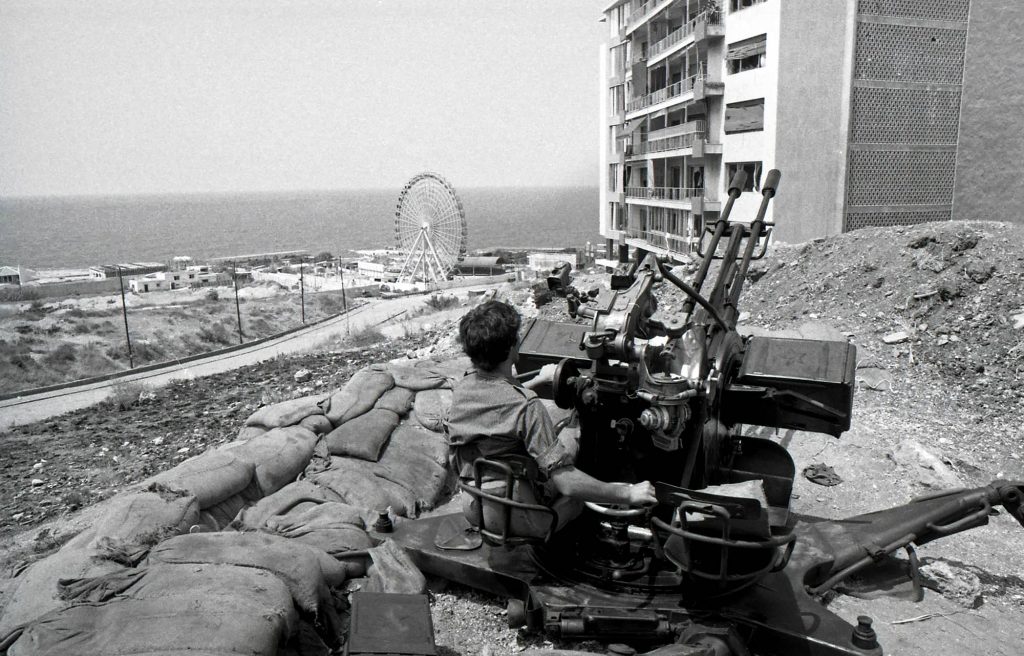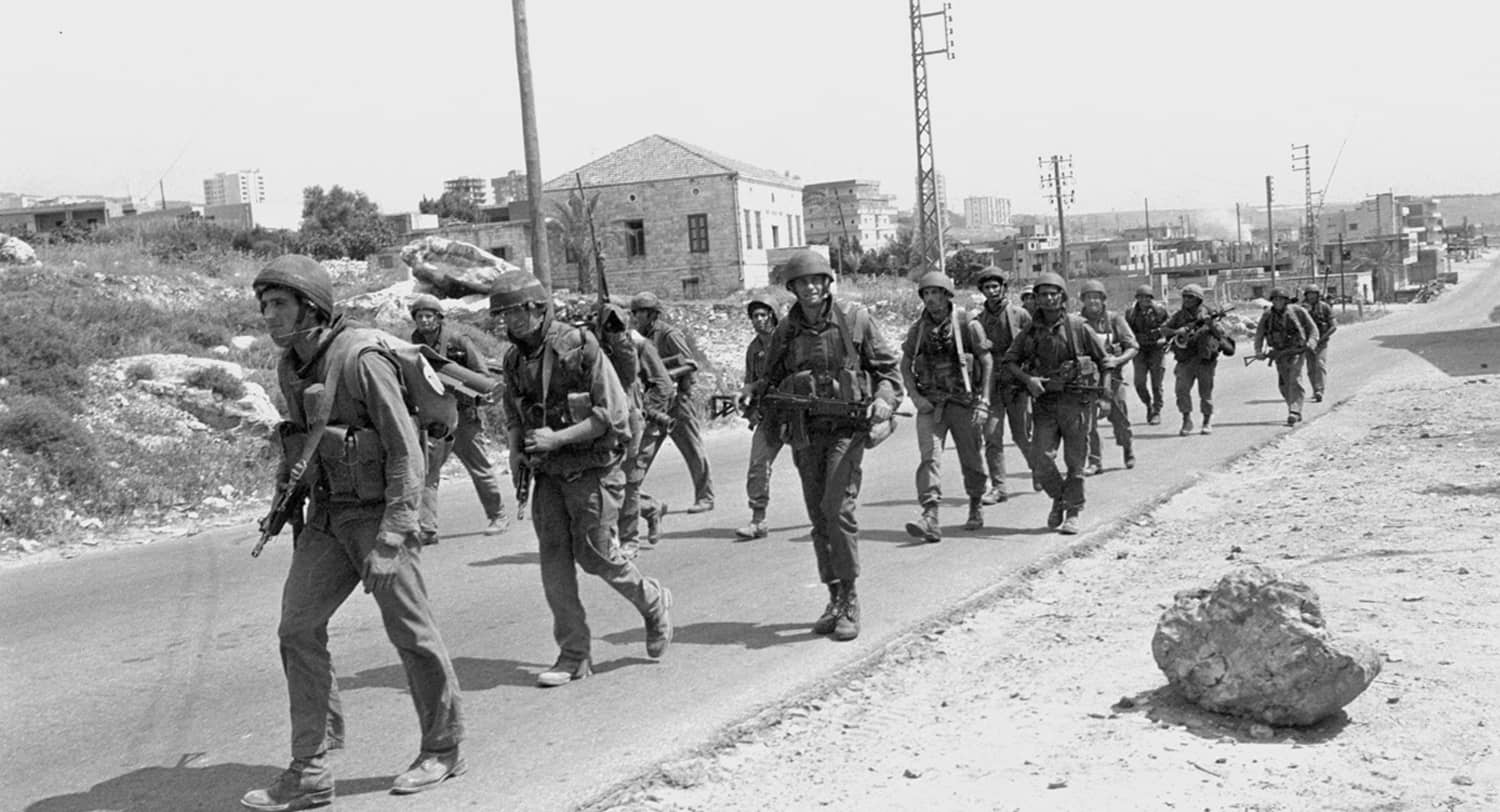Three former US military officers recently reflected in these pages on the “The Lessons We Should have Learned from Vietnam,” based on their experiences in that war. Here are three former Israeli officers who similarly reflect on the formative war of their careers – the 1982 invasion of Lebanon.
Doron Almog on a Misguided Strategy
One lesson I carry with me is that the frontline combat troops will always be the true guarantee of Israel’s survival – even when the national leadership is strategically blind or misguided. In 1982, we had already witnessed the arrogance and blindness which marked the era before the 1973 Yom Kippur War. In Lebanon, we further faced the delusion of a “new order” in the region, which rested upon the weak reed of cooperation with the Christian Forces.
I served in the 1982 war as the commander of a makeshift paratroop battalion, created for a specific mission which was to lead a brigade on a 40-mile march from the landing on the Awali coast northward to the outskirts of Beirut.
For me, the formative moment in the war came on Wednesday, 9 June 1982, the fourth day of the war, in the picturesque village of Kafr Matta southeast of Beirut. We were caught in an ambush in the nearby village of Daqqoun and were trapped on lower ground. It ended after four hours of close combat, in which we turned the situation around. Most of the Palestinian force which ambushed us was wiped out, with some 50 dead, while we suffered a few wounded, and ended up in control of the high ground at the edge of Kafr Matta.
None of us, at the time, would have dreamed that we would only fully leave Lebanon 18 years later, in May 2000. When we began the invasion (codenamed “Peace for the Galilee”), the common assumption was that Lebanon would soon be the second Arab country to sign a peace treaty with Israel ( after Egypt in 1979). But once Christian leader and President-elect Bashir Gemayel was assassinated on 14 September 1982, and we went through the massacre at the Sabra and Chatila refugee camps [the mass killing of Palestinian civilians by Lebanese Forces, which Israel had failed to prevent) it should have been clear that there was no point in staying in the Beirut area and in the Chouf Mountains amidst growing violence.
In fact, we stayed on for three more years of bloodshed until the summer of 1985, losing our best and brightest in a war the purpose of which was becoming less and less clear.
Looking back, it is clear that the idea of a “new order” that guided the operation’s planners was utterly removed from Lebanese realities, then and now: a broken up and divided country, with a weak Christian minority that, as we should have known early on, had no chance of holding power, especially after the assassination of Bashir Gemayel.
The Lebanon war also taught us practical lessons about fighting terrorism – and about our limited ability to envision what things would look like when the fighting is done. True, Yasser Arafat and the PLO were driven out from Beirut to Tunis, but what came in their place was Hizbullah and an ever more dangerous Iranian grip on our northern border.
The price paid for the Lebanese entanglement was high – a major economic crisis, with inflation at 400%, a deeply divided public, and a severe crisis of national motivation. All this led the government to retreat from the Chouf mountains after three years and settle for the defense of the northern border of Israel from the so-called Security Zone in southern Lebanon for 15 more years, until the final withdrawal in May 2000.
The fighting spirit which I witnessed in battle lives on. But the appetite for transformative adventures beyond our borders has been tempered.
Shaul Arieli on Tactical Lessons and on the Futility of Force for Political Problems
In the First Lebanon War, I was a young commander, 22 years old, of a paratroop company of five platoons with nearly 150 soldiers and officers under my command.
My first mission was to come in by sea, with the help of our navy, and take the beachhead at the mouth of the Awali River north of Sidon. We were to block the Lebanese coastal road, and enable the landings of the rest of the brigade coming in by landing craft and helicopter.
Later I led the forces as the point company of the brigade through the mountains to the outskirts of the town of Damour, south of Beirut. Throughout, we lost three soldiers and a number were wounded, myself among them.
One tactical lesson learned is the importance of preparations relevant to the mission. On the positive side, the company soldiers had trained since being drafted in November 1981 in simulated sea-borne landings, urban warfare, assault on fortified positions and so on. The commanders had studied the terrains in which we might fight – landing from the sea at the Awali or the Zaharani River, air assault on the Damascus-Beirut highway – all of which proved worthwhile on the first night, when we had gone into our boats so as to land at the Zaharani, but based on real-time intelligence we changed course and steered north to the Awali.
On the negative side, our preparations did not include study of the population in the combat zone or of inter-confessional relations among Lebanese Christians, Shi’ites, Druze and others. We did not dedicate even a single training session to prepare for fighting amidst a civilian population – which in the first day of combat led to unnecessary casualties among uninvolved civilians and at the same time also to losses of our own.
In addition, we lacked training in dealing with post-traumatic stress. As we were landing on the Awali coast one of the soldiers – considered to be the best in the company – was afflicted by stress through handling wounded soldiers on shore, as they were about to be carried over to the boats and evacuated home. The platoon commander, faced with the soldier’s behavior, chose to have him shipped back home, rather than divert him to another segment of the company. This soldier ended up dealing with long years of PTSD, which may well have been alleviated.
Today, 40 years after the war, I want to add a strategic-level lesson: the futility of the use of force in solving political problems.
In the early 1950s, some Israeli leaders were unhappy with the security aspects of the young country’s borders and toyed with various plans to expand beyond the 1949 armistice lines. The IDF chief of staff at the time, Moshe Dayan, suggested in 1955 that southern Lebanon up to the Litani River should be conquered and annexed and the rest of the country turned into a Christian Maronite state.
Ben-Gurion, for his part, abandoned the illusion of the use of force to expand borders. In an interview on 2 October 1959 in Haaretz newspaper, he suggested that “anyone who thinks that today you can use military force alone to resolve historical disputes between nations has no sense of the world in which we live…”
Ariel Sharon, the minister of defense in 1982, ignored Ben-Gurion’s admonition. But the assassination of Bashir Gemayel later that year, followed by the immediate collapse of the Lebanon-Israel Peace Treaty, thwarted his plans and ultimately Israel was driven, bloodied, to a unilateral withdrawal 18 years later.

Yair Golan on Tactical Lessons and Staying Too Long
The infantry battalion, in which I served as a cadet in 1982, fought the Syrian army on the eastern flank of our invasion. We went into Lebanon on the first day of the war just east of the village of Ghajjar, close to the Golan Heights and from there to Kawkaba in the Bir al-Dahar mountain range where we ended the first week of the war on high ground.
We fought the Syrian Army facing accurate artillery fire, Soviet made T-62 tanks, Gazelle combat helicopters, and commando forces. The Syrian military conducted retreat and delay battle tactics at a good level of proficiency. We attacked along a mountainous route that was little more than an agricultural dirt road, disrupted in places. Bringing in an armored brigade through this poor road surprised the Syrians, and exposed their forces in the Beqaa Valley to our tank fire at effective ranges.
One lesson was logistical in nature. We infantrymen hardly had any food. Every night we begged the tankers for MREs (Meals Ready to Eat), and during the day we would gorge on cherries, so abundant in Lebanon, and ended up paying with nasty diarrhea for our sin of gluttony. The heat was terrible, the weight of our gear was unbearable, and to this we added a few hand grenades and a third water bottle.
Whereas the fighting during the day proceeded in a commendable manner, it is important to note that there was no progress made at night. The nights were dedicated to rest stops, and looking back this was a bad mistake, because it made it easier for the Syrians to re-organize themselves for the next day.
Our losses were mainly due to artillery fire. It was clear to all that we could not send the wounded by ground vehicles on a narrow, congested mountain route, and so each such event required a helicopter landing and airborne medevac. The helicopter pilots did a superb job, and each such medevac added to our sense of confidence as infantry soldiers – knowing that even if wounded, we would rapidly reach a hospital back home.
An important tactical lesson occurred during the taking of the village of Dnaibeh. We fought there, to the best of my memory, on the fourth day of the war. A tank battalion had tried to conquer it the previous night, met with sporadic fire, and turned around and left the scene. In the morning we were ordered to take the village. Resistance was weak, the village was swiftly taken, and the Syrian commando soldiers were quick to surrender. Undoubtedly, the lesson is that a built-up area is the right and proper field for infantry backed by tanks, not the other way around.
At the end of the first week of fighting, our battalion was redeployed to take up a defensive position on the western slopes of the Eastern Lebanon mountains. The line of defense was at the height of 5000 feet, the landscape was breathtaking, the heat was oppressive, and swarms of bugs ate us up. Against an enemy such as this we had no defenses, and after a week we went back through eastern Lebanon with our APCs for a period of reorganization and return to combat readiness, in the training areas of the Golan Heights.
Looking back, I can say today that the ejection of the PLO from Lebanon was an immense achievement. Equally immense was the strategic mistake of staying in Lebanon. It took 18 years and hundreds of dead for us to understand that there was no prospect for success. We relied largely on defensive action against a weaker but highly determined enemy who found effective ways to draw our blood, and even more so, the blood of our Southern Lebanon Army allies – whom we confined to fortified positions which became sitting targets for Hizbullah initiatives.
I will always carry with me the memory of the mountainside thickets, the villages, the snowstorms and the cedars of Lebanon – and above all the memory of my friends who fell there in the beautiful, bloodied country to the north of us.



